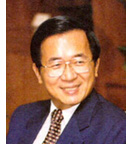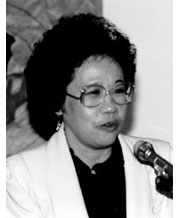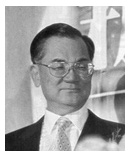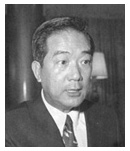Year 2000 Presidential Elections
On 18 March 2000, Taiwan
held its second direct presidential elections. Democratic
Progressive Party candidate Chen Shui-bian won a stunning victory,
making it the first time in Taiwan's history that an opposition
party has won over the entrenched Kuomintang. Mr. Chen won 39.3
percent of the vote, independent candidate James Soong 36.8 percent,
while KMT candidate Lien Chan came in a distant third with 23.1
percent of the vote.
The March 2000 elections are
thus a "coming-of-age" of democracy in Taiwan. The present
President, Lee Teng-hui, was elected in 1996 against the background
of threatening Chinese missile firings and military exercises. Prior
to 1996, the presidential election was determined in a
closely-manipulated process by the KMT-controlled National Assembly.
Below, we take a closer look
at each candidate.
Real-time
election results on 18 March 2000
Chen
Shui-bian, Democratic Progressive Party (DPP)
Website:
http://www.abian.net/
Endorsement by the Taiwanese
Association of America
Analysis of the DPP by
Prof. Shelley Rigger

Mr. Chen has for many years been the rising star of the democratic
opposition movement. He first became known in the early 1980s as a
member of the team of defense lawyers which defended the eight major
opposition leaders arrested and imprisoned after the December 1979
Kaohsiung Incident .
The group of defendants and their lawyers subsequently became the
core of the democratic opposition movement: one of the defendants,
Ms. Lü Hsiu-lien (see below) is now his vice-presidential
running mate.
In the mid-1980s, Mr. Chen was elected as a member of the Taipei
City Council and became known as an spirited critic of corruption
and mismanagement in City Hall. In November 1985, Mr. Chen and his
wife, Wu Shu-chen, paid a high price for their political beliefs:
during a campaign trip to Tainan county, Mrs. Chen was run over by a
farm vehicle and became paralyzed from the waist down. The driver
was never charged.
In the mid-1980s, Mr. Chen was also active in the budding "tangwai
magazine" movement: a group of publications associated with the
democratic opposition. These publications were banned and
confiscated frequently by the ruling KMT authorities. Mr. Chen
served eight months in prison on a "libel" conviction for
a magazine for which he served as legal counsel.
From 1989 through 1994 he served in the Legislative Yuan, and
increased his profile as a hard-hitting opponent of corruption and
inefficiency. In 1994 he ran, and won, in the first-ever elections
for the position of Taipei mayor. Until then, the position had been
an appointive post, traditionally given to KMT stalwarts.
During his term as Taipei mayor he took significant steps to
improve traffic in Taipei, and cracked down on the city's sex
industry. He was highly popular, and gained widespread praise for
his achievements. However, he lost his re-election bid in 1998 by a
slight margin, when the Kuomintang -- which had been split in 1994
-- united its money-machine behind KMT candidate Ma Ying-jeou.
In the run-up to the present elections, Mr. Chen has focused on
both local politics as well as international policies: he has
attacked the "black-gold" connection, and at the same time
has issued a number of White
Papers, setting out the DPP's policies, which would be
the government's policies if he is elected on March 18th 2000.

On 10 December 1999, Mr. Chen announced in Taipei that his running
mate in the Presidential elections would be Ms. Annette Lü
Hsiu-lien, who presently serves as County Magistrate for Taoyuan
County, just south of Taipei. Taoyuan County is a heavily
industrialized area, and is the second most populated county in
Taiwan with 1.2 million people.
Ms. Lü became well-known in Taiwan in the late 1970s as a
member of the budding democratic opposition and as a leading woman's
rights advocate. She gave a major speech at the now well-known
Kaohsiung Incident in December 1979 and was subsequently arrested
and sentenced to 12 years imprisonment.
She was adopted by Amnesty International as a prisoner of
conscience, and was released on medical bail on 28 March 1985, after
more than 5 years imprisonment. After her release she spent some
time in the United States at Harvard University -- where she had
been a visiting scholar in the mid-1970s. She has a degree in
comparative law from the University of Illinois.
In 1992 she returned to Taiwan to became active again in the
democratic opposition of the DPP, and ran successfully for a seat in
the Legislative Yuan in December 1992. She became one of the driving
forces behind the initiative to get Taiwan into the United Nations.
In March 1997, Ms. Lü was elected Taoyuan County Magistrate in
a by-election.
Lien Chan: making Al Gore look exciting
Website:
http://www.yes2000.org.tw/

Mr. Lien Chan was selected as the Kuomintang's presidential
candidate in a KMT Party Congress in August 1999. He chose Prime
Minister Vincent Siew as his running mate. Both men are able
technocrats, and Mr. Siew has a solid background in economics.
The problem with Mr. Lien Chan is that he is a dour politician.
The standard joke in Taiwan is that Mr. Lien "…makes
US Presidential candidate Al Gore look exciting."
Another problem with Mr. Lien is that he is exceedingly wealthy.
For many in Taiwan this raises the question how his wealth was
obtained. While there are no direct indications that Mr. Lien's
wealth was achieved in other than legitimate business practices,
there is a long history of links between the KMT's wealth -- "gold"
in Taiwan's terminology -- and the not insignificant underworld of
gangs and triads -- "black" in Taiwan's political
spectrum.
The opposition DPP has long criticized the linkage between "black"
and "gold." A number of well-known figures in the
underworld were able to "buy themselves clean" by running
for office and even being elected to positions such as the
Legislative Yuan and County Magistrate. The Kuomintang has
traditionally condoned such activities and has done very little to
stem the influence of the underworld and money in politics.
Mr. Lien was able to bolster his position recently, when he came
out with a strong position on defense against China, suggesting that
Taiwan should develop long-range missiles which could be used to
retaliate against China in case of an attack against the island by
the PLA.
Mr. Lien Chan also has the formidable KMT party machine behind
him, and can count on the active campaigning of the charismatic
President Lee Teng-hui. He is thus a strong candidate -- but at the
time of this writing is running third in the opinion polls.
James Soong's financial scandal
Website:
http://www.soong.org.tw/

Until mid-December 1999, Mr. Soong was the front runner, scoring
significantly ahead of his two rivals in the opinion polls. As
governor of "Taiwan Province" from 1994 through 1998 he
had been able to build up a wide network of supporters, enhancing
his position and creating goodwill -- especially in the poorer
central and southern counties of the island -- by generously
dispensing funds for roads, streetlighting and other public
infrastructure.
He also had a smooth public relations machine, drawing from the
many New Party supporters working in the media. While the New Party
did come up with its own candidate, it was public knowledge in
Taiwan that the pro-unificationist mainlanders supported their
favorite-son, Soong.
Mr. Soong had his fall-out with president Lee Teng-hui earlier in
1998-99, when President Lee decided to honor his agreement with the
democratic opposition of the DPP to phase out the anachronistic "Provincial
Government", which happened to be the power-base of Mr. Soong.
The matter came further to a head in August 1999, when the
Kuomintang decided to support the dour vice-President Lien Chan as
its candidate for the upcoming elections, sidelining the flamboyant
Soong.
From August through December 1999, the situation looked rather
grim for the Kuomintang: Soong surged ahead and stayed ahead in the
opinion polls. Not that opinion polls are all that reliable in
Taiwan: various polls show a difference in support for any of the
major candidates of sometimes up to ten percentage points -- all
within the same week. This lead to suspicions that some polling
organizations have a hidden agenda -- in favor of Mr. Soong.
In mid-December 1999 the situation changed suddenly, when a
Kuomintang legislator, Mr. Yang Chi-hsiung, disclosed that he knew
of a multi-million dollar fund, stashed away in the bank accounts of
Mr. Soong's son and sister-in-law.
After several days of various explanations, Mr. Soong finally
came up with a story that President Lee had directed him to use this
money, an amount of some NT$ 140 million (equivalent to some US$ 4.6
million) to help support the remaining relatives of former President
Chiang Ching-kuo. President Lee immediately dismissed the story as
"nonsense", while the remaining relatives
of President Chiang said they had no knowledge of such support.
In the following days, further reports of fuzzy funds -- up to
the amount of some US$ 36 million -- in the accounts of James Soong
relatives surfaced.
On 27 December 1999, the United Daily News even reported that Mr.
Soong's sister-in-law, Chen Pi-yun, had transferred a total of some
US$ 6 million to two accounts in San Francisco. At several lengthy
press conferences, Mr. Soong tried to talk himself out of the mess,
prompting President Lee to call him a "lying thief."
Peruse the Taipei
Times for further information.
|

